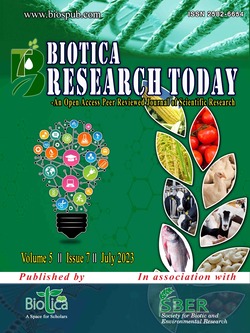
Role of Pressmud in Soil Health and Crop Production
M.L. Dotaniya*
ICAR-Directorate of Rapeseed-Mustard Research, Bharatpur, Rajasthan (321 303), India
M.D. Meena
ICAR-Directorate of Rapeseed-Mustard Research, Bharatpur, Rajasthan (321 303), India
M.K. Meena,
ICAR-Directorate of Rapeseed-Mustard Research, Bharatpur, Rajasthan (321 303), India
C.K. Dotaniya
Dept. of Soil Science & Agricultural Chemistry, SKRAU, Bikaner, Rajasthan (334 006), India
Rajhans Verma
SKN College of Agriculture, Jobner, Rajasthan (303 328), India
R.K. Doutaniya
SKN College of Agriculture, Jobner, Rajasthan (303 328), India
DOI: NIL
Keywords: Heavy metals, Pressmud, Soil health, Soil organic matter
Abstract
Overall, the incorporation of pressmud (PM) in crop production provides several benefits, including improved soil fertility, enhanced nutrient supply, better water management and environmentally friendly agricultural practices. However, it is essential to consider the nutrient content of pressmud and adjust application rates based on crop requirements and soil conditions to optimize its positive impact on crop production. PM is applied based on soil reaction by mediating the soil rhizosphere. Incorporation of PM in most of the soils improved the soil health parameters and crop sustainability in a region. Crop production is heavily impacted by soil conditions and management strategies. It could be a source of soil organic carbon in locations where FYM/crop residues are scarce. On the other hand, the potential application of PM in crop production solves the storage problem in sugarcane industries.
Downloads
not found
Reference
Dotaniya, M.L., Datta, S.C., Biswas, D.R., Dotaniya, C.K., Meena, B.L., Rajendiran, S., Regar, K.L., Lata, M., 2016. Use of sugarcane industrial byproducts for improving sugarcane productivity and soil health-a review. International Journal of Recycling Organic Waste in Agriculture 5(3), 185-194. DOI: https://doi.org/10.1007/s40093-016-0132-8.
Kalaivanan, D., Hattab, K.O., 2008. Influence of enriched pressmud compost on soil chemical properties and yield of rice. Research Journal of Microbiology 3(4), 254-261. DOI: https://doi.org/10.3923/jm.2008.254.261.
Kumar, S., Meena, R.S., Jinger, D., Jatav, H.S., Banjara, T., 2017. Use of pressmud compost for improving crop productivity and soil health. International Journal of Chemical Studies 5(2), 384-389.
Poria, V., Jhilta, P., Rana, A., Khokhar, J., Singh, S., 2022. Pressmud: a sustainable source of value-added products. Environmental Technology Reviews 11(1), 187-201. DOI: https://doi.org/10.1080/21622515.2022.2144767.
Salman, M., Inamullah, Jamal, A., Mihoub, A., Saeed, M.F., Radicetti, E., Ahmad, I., Naeem, A., Ullah, J., Pampana, S., 2023. Composting sugarcane filter mud with different sources differently benefits sweet maize. Agronomy 13(3), 748. DOI: https://doi.org/10.3390/agronomy13030748.
